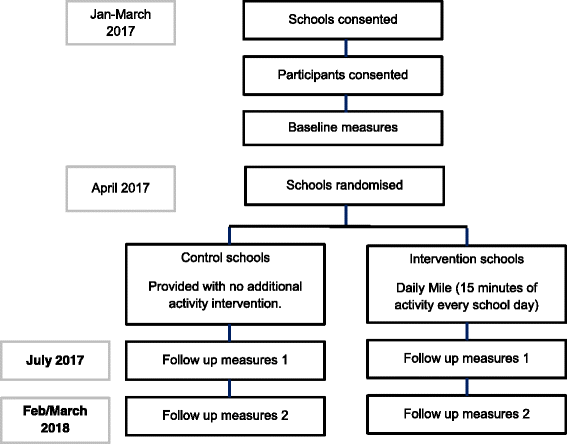A cluster randomised controlled trial evaluating the effectiveness and cost-effectiveness of the daily mile on childhood obesity and wellbeing; the Birmingham daily mile protocol
- PMID: 29325517
- PMCID: PMC5765641
- DOI: 10.1186/s12889-017-5019-8
A cluster randomised controlled trial evaluating the effectiveness and cost-effectiveness of the daily mile on childhood obesity and wellbeing; the Birmingham daily mile protocol
Abstract
Background: Childhood obesity prevention is a public health priority. Children spend a large proportion of their waking time in school; therefore this is an appropriate setting to implement obesity prevention initiatives. Anecdotal reports suggest that implementing The Daily Mile in schools has had positive effects on childhood obesity, academic attainment and wellbeing. This trial aims to measure the effectiveness of The Daily Mile for improving health and wellbeing.
Methods: This protocol describes a cluster randomised controlled trial (RCT) in 40 primary schools located in Birmingham, UK. Eligible participants are children in years 3 (aged 7-8) and 5 (aged 9-10). The study compares The Daily Mile (intervention) to usual practice (control) in relation to health and wellbeing. The Daily Mile intervention involves an additional 15 min of running or walking integrated into the school day, throughout a 12 month study period. The primary clinical outcome is body mass index (BMI) z-scores at 12 months following introduction of the intervention. The cost per Quality Adjusted Life Year (QALY) is the primary outcome of the economic evaluation. Secondary outcomes include wellbeing, physical fitness and teacher reported academic attainment.
Discussion: This study is the first RCT investigating the clinical and cost-effectiveness of The Daily Mile. A range of outcomes will be measured to evaluate the broader wellbeing and academic benefits in addition to clinical outcomes typically measured in childhood obesity prevention trials. The intervention is simple and low-cost, therefore if the benefits are demonstrated it has enormous potential to influence future policy.
Trial registration: ISRCTN: 12698269 . Date protocol registered 27th October 2016.
Keywords: Childhood obesity prevention; Cluster randomised controlled trial; Cost-effectiveness; Physical activity; School-based intervention; Wellbeing.
Conflict of interest statement
Ethics approval and consent to participate
Ethics approval was obtained from the University of Birmingham Research Ethics Committee (reference number 16–0064). Consent was obtained from participants’ parents and verbally from participants before measures were taken.
Consent for publication
Not applicable.
Competing interests
The authors declare that they have no competing interests.
Publisher’s Note
Springer Nature remains neutral with regard to jurisdictional claims in published maps and institutional affiliations.
Figures
References
-
- Health and Social Care Information Centre (HSIC): National Child Measurement Programme, 2015–2016.
-
- Poirier P, Giles TD, Bray GA, Hong Y, Stern JS, Pi-Sunyer FX, Eckel RH. Obesity and cardiovascular disease: pathophysiology, evaluation, and effect of weight loss. An update of the 1997 American Heart Association scientific statement on obesity and heart disease from the obesity Committee of the Council on nutrition, physical activity, and metabolism. Circulation. 2006;113(6):898–918. doi: 10.1161/CIRCULATIONAHA.106.171016. - DOI - PubMed
Publication types
MeSH terms
Associated data
Grants and funding
LinkOut - more resources
Full Text Sources
Other Literature Sources
Medical


